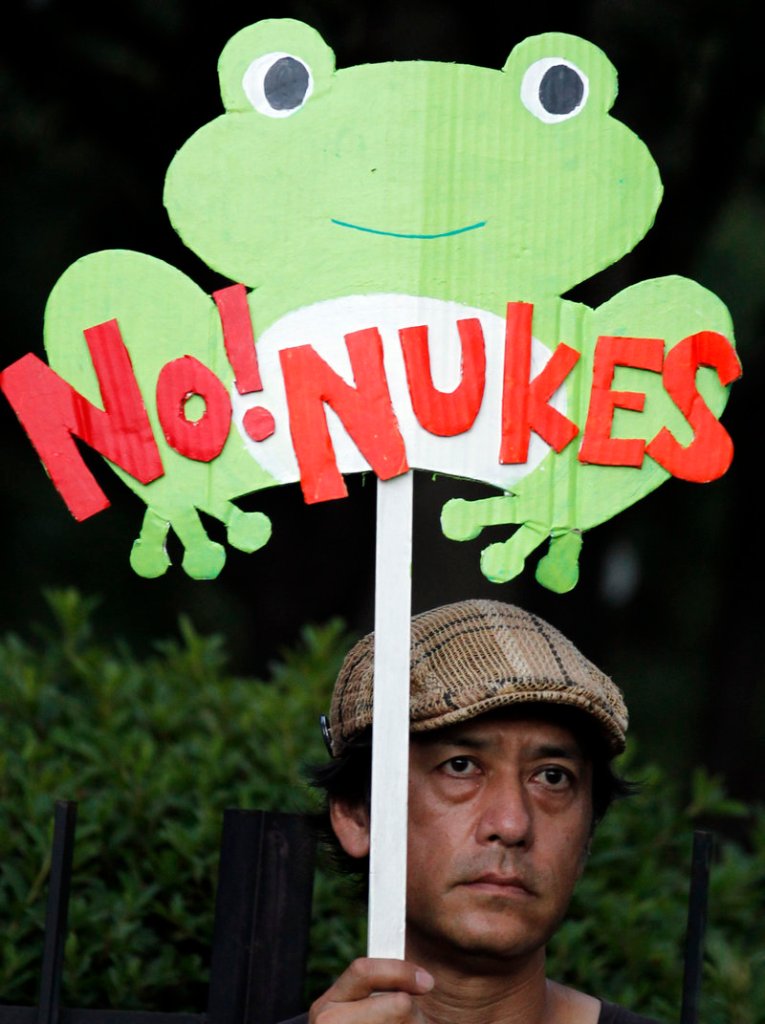TOKYO — A Cabinet panel on Friday called for Japan to phase out nuclear power over the next three decades in what would be a major shift of national energy policy prompted by the Fukushima meltdowns.
Reversing Japan’s decades-long advocacy of nuclear power is popular with the public, though it faces opposition from powerful business interests. The new policy calls for greater reliance on renewable energy, more conservation and sustainable use of fossil fuels and would see Japan joining Germany in turning its back on nuclear energy.
The proposal requires endorsement by the entire Cabinet, which Japanese news reports say has already agreed to the changes.
Prime Minister Yoshihiko Noda said the new policy was just the beginning of a long and difficult process.
“We are only at the starting line,” Noda said. “Now we are going to begin an extremely difficult challenge. No matter how difficult it is, we can no longer put it off.”
The phase-out of nuclear power by the 2030s is to be achieved mainly by retiring aging reactors and not replacing them.
Japan began reviewing its energy policy following last year’s disaster at the Fukushima Dai-ichi nuclear power plant, which was set off by a massive earthquake and tsunami. Before the accident, the resource-poor country relied on nuclear power for one-third of its energy and had planned to raise that to 50 percent by 2030.
“Based on facing the reality of this grave accident and by learning lessons from the accident, the government has decided to review the national energy strategy from scratch,” said the policy document. “One of the key pillars of the new strategy is to achieve a society that does not depend on nuclear energy as soon as possible,” it said.
Growing anti-nuclear sentiment and mass protests made it difficult for the government and plant operators to restart reactors idled for inspections. Imports of oil and gas for electricity generation have surged as a result and Japan’s trade balance has swung into deficit.
The new policy is just a rough outline and further details will have to be decided later, National Policy Minister Motohisa Furukawa told a news conference.
But it reflects “the country’s commitment to overcome the harsh reality of the aftermath of the Fukushima accident,” he said.
He and officials acknowledge many questions remain unanswered, among them how to pay for the costly expansion of renewable energy and how to minimize the environmental impact of a return to heavier use of natural gas and other fossil fuels.
The proposed new policy calls for adhering to a 40-year lifespan for each reactor and for building no more new reactors. It leaves open the possibility of restarting reactors before they are eventually phased out, but only if they have passed strict safety tests and won approval by a newly formed regulatory commission.
An allowed exception of a 20-year extension to the 40-year cap, as well as the ongoing construction of two new reactors, raised a question of whether Japan is serious about abandoning nuclear energy.
“We will launch all possible policy measures to achieve a nuclear-free society by the 2030s,” it said. “Until the total phase-out we will only use nuclear reactors that are confirmed safe.”
The new policy delays a decision on spent fuel processing and radioactive waste disposal, leaving open the questions of how Japan will handle its spent nuclear fuel and avoid accumulating stockpiles of plutonium.
The new policy delays a decision on spent fuel processing and radioactive waste disposal, leaving open the questions of how Japan will handle its spent nuclear fuel and avoid accumulating stockpiles of plutonium. The new policy allows Japan to continue its fuel recycling program, despite the nuclear phase-out. The contradiction prompted U.S. Deputy Secretary of Energy Daniel Poneman to raise concerns about Japan’s ability to reduce plutonium stockpiles, said senior Japanese ruling lawmaker Seiji Maehara, who met with Poneman in Washington this week.
Japan initially imported nuclear power technology from the U.S., while its fuel reprocessing relies heavily on Britain and France.
“The road to a nuclear-free society is not easy,” it says, forecasting economic growth at a modest rate of 0.8 percent annually under a nuclear-free scenario.
Following Japan’s 2011 Fukushima disaster, Germany decided to speed up phasing out its nuclear power plants, shutting them down within a decade and betting on renewable energies instead. Nuclear power had accounted for a little more than 20 percent of Germany’s needs but has since fallen well below that level.
Copy the Story Link
Send questions/comments to the editors.



Success. Please wait for the page to reload. If the page does not reload within 5 seconds, please refresh the page.
Enter your email and password to access comments.
Hi, to comment on stories you must . This profile is in addition to your subscription and website login.
Already have a commenting profile? .
Invalid username/password.
Please check your email to confirm and complete your registration.
Only subscribers are eligible to post comments. Please subscribe or login first for digital access. Here’s why.
Use the form below to reset your password. When you've submitted your account email, we will send an email with a reset code.